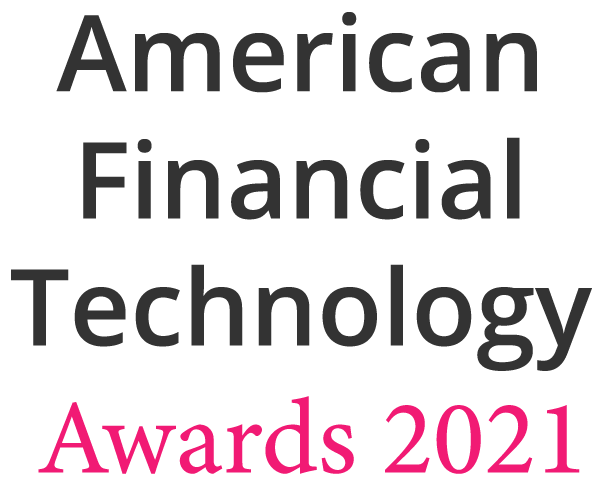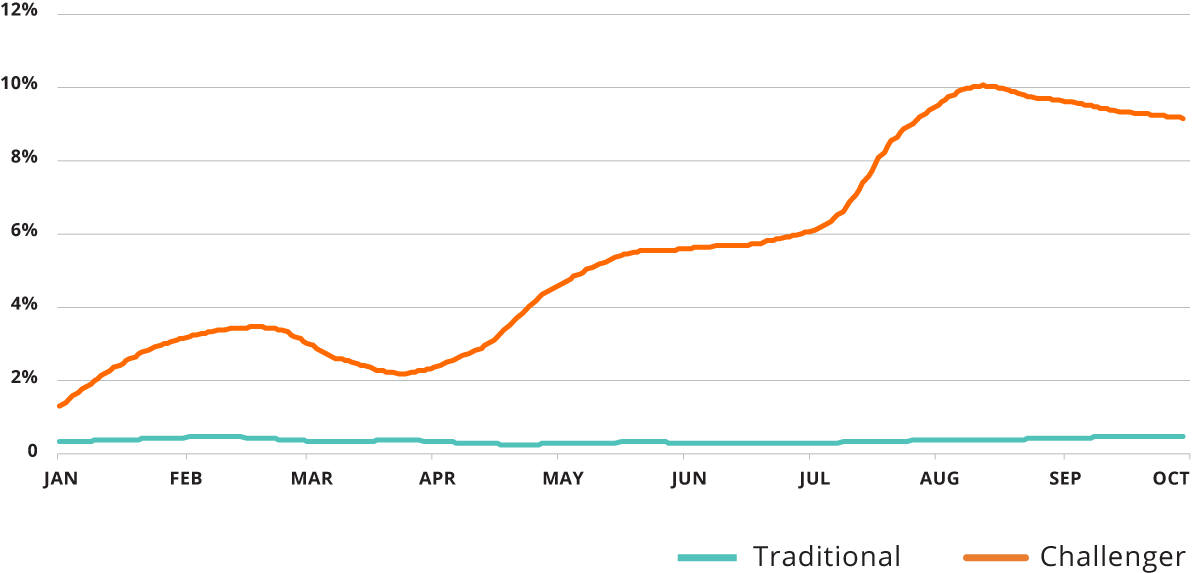To our valued customers and industry friends,
2020 is officially in the rear view mirror. As you may know, towards the end of the year, I was both humbled and grateful to have the opportunity and support of the organization to become the CEO of Socure. To mark a tremendous period of growth and opportunity for both myself and the company, I wanted to look back at the important trends we witnessed in the industry, as well as reflect on milestones we achieved over the last 12 months.
While 2020 was unprecedented in many ways and presented incredible challenges, especially on the human level, I am proud to say that we navigated it successfully, as a team, and learned so much along the way. I also want to thank our many customers and strategic partners as we look forward to the opportunity to continue serving you in 2021 and for many more years.
Fraud Trends
As we dissect the impact of the COVID-19 pandemic on digital identity fraud, it’s clear the industry suffered from much more than being overwhelmed with video meetings. In fact, a stark paradigm shift took place which was accelerated by the evolution from a digital-first to digital-only business environment. This rapid transformation was brought on by abrupt shelter-in-place orders, unprecedented unemployment rates, a sudden economic downturn, and multiple stimulus relief packages combined to create a perfect storm of customer experience challenges and attempted fraud attacks on banks, fintechs, state unemployment agencies, and many other digital commerce companies at a staggering rate.
Since the beginning of the pandemic, overall fraud attempts have nearly doubled, with particularly high spikes in April and July, plus another strong uptick starting in September. Here is a summary of the fraud patterns we witnessed in 2020, or you can access the entire Socure Fraud Report we published last July.
Credit Card Providers: First Group to be Hit by Epic COVID Fraud Attacks
The credit card market is notoriously subject to dramatic fraud volumes, so it was no surprise to us to observe a nearly 90% increase in attempted fraud from new credit card applications in March and April. Socure was able to thwart these attacks just as lenders also tightened credit availability to manage risk. With that well drying up, the spike leveled off because scammers moved to other sectors that they believed would be more profitable, which I’ll address below.
ACH Fraud Hits Investment Brokerages for First Time Ever
Against a flurry of new account openings that brokerage firms experienced during the pandemic as the S&P dropped nearly 40%, they were also met with a new challenge: ACH fraud. Fraudsters took a literal gamble that brokerages would accept a stolen or fake bank account as a funding source and then provide a line of credit against which they could trade. For brokerages who were overwhelmed with supporting new account openings digitally for the first time and where proper identity verification and ID fraud controls were lacking, fraudsters gained access to funds for risk-free trading. They couldn’t withdraw the line of credit, but they did divert trading gains to another stolen bank account or one created with a synthetic identity.
Our data indicates that investment account opening fraud attempts rose a whopping 150% between April and May, forming a distinct bell curve that reached its peak in late April. There has also been a steady rise in ongoing ACH fraud attempts since July.
Challenger Banks Hit Hard with Massive Fraud Attempts Unlike Traditional FIs
Challenger banks–born to be digital only–were hit the hardest with attempted fraud, while traditional banks were hit less so and yet forced to step up their digital-first game. Challenger banks experienced a 200% increase in attempted DDA fraud between March and June, whereas traditional bank attempted fraud remained almost flat throughout the entire year, which you can see in the graph below.
Money Transfer Accounts Act as a “Getaway Car” for Fraudsters
New account openings to support money transfers experienced the biggest move to digital of any financial services sector during the COVID-19 pandemic, since this business historically operates as physical retail outlets. We saw a 43% increase in attempted money transfer fraud and a significant 73% rise in brand-new devices between March and June. Money launderers were attempting to hide while planning to use newly-opened money transfer accounts to “escape” with bogus stimulus or unemployment funds sent domestically and abroad.
Synthetic Identity Fraud Batters PPP Loans
Nothing created a bumpy ride in attempted fraud like the introduction of the Paycheck Protection Program (PPP) in April. For many fraudsters, it represented “free money,” or so they thought. We know now that many of these attempts were proliferated by synthetic identities—where fraudsters cobbled together fictitious identities using a combination of stolen and fake attributes.
The Department of Justice (DOJ) has since charged dozens of alleged scammers with stealing related to misuse of funds. In October, we chronicled one of those cases in a white paper, Anatomy of an Alleged PPP Synthetic Identity Fraud Deal, where you can read first-hand about the audacity of these alleged fraudsters. These developments in particular generated immense appetite for our newest product, Sigma Synthetic Fraud.
Heading into 2021, financial institutions and fintechs are not the only ones who will continue to be hit by identity fraud. Adjacent and emerging digital markets–like telcos, utilities, healthcare, online gaming, and others–will be hit with ID fraud; really any business at the intersection of scale and high value or money movement is at risk. Many organizations now need a strong and layered sequence of defenses to identify attackers, while quickly being able to onboard legitimate users in a friction-free way.
Net-net, the business-to-consumer economy is evolving from digital first to digital-only, making trusted identity at Day Zero and beyond more important than ever. So please, let us know how we can help you protect your business and better serve your good customers.
Growth Trends
Fraud aside, I cannot stress enough the shifting growth and customer acquisition priorities within the digital ecosystem we observed this year. As many of our customers’ brick and mortar operations were closed, a new generation of consumers was coming online to obtain services. With digital as the default method to do business, the need to automatically identify good IDs, without introducing friction, among thin-file Millennials and Gen Z segments became a top priority in a very short amount of time. Whether these new users were signing up for a bank account, credit card, or a phone plan for the first time, Socure’s Intelligent KYC service was routinely the most talked about product around this budding opportunity. We expect this emerging trend, playing a significant role in fueling end-user growth, to continue well into 2021 and beyond.
Notable Milestones: Five New Products Tackle Rapid Acquisition Scale and Rampant Fraud
Within our business, we grew our customer base, launched a number of new products and upgrades, enhanced our existing product suite with superior technology and more accuracy, received significant industry recognition, and raised another round of venture financing. Specific highlights include:
Customer Growth and Expansion:
- Increased number of customers by over 85% YoY (direct & channel)
- Now work with three of the top five US Banks
- Now work with three of the largest MSBs
- Expanded our presence into adjacent markets, including online gaming, ePharmacy, mortgage lending, telehealth, and more
New Product Announcements:
- Intelligent KYC – Leveraging market-leading diversity in data combined with proprietary query and matching analytics, Intelligent KYC delivers clear, actionable results and reason codes at onboarding with both mainstream and “thin file” populations.
- Global Watchlist with Monitoring – Gauge the integrity of your customer base during onboarding and throughout the customer lifecycle with hyper-tuned real-time AML/watchlist queries.
- Sigma Synthetic Fraud – Developed for a digital-first environment, Sigma Synthetic Fraud deploys a multi-layered approach that looks beyond PII elements and leverages advanced analytics and diverse, deep data sets to gain conviction on synthetic ID fraud risk.
- Sigma Identity Fraud (v2 upgrade) – The next iteration of Sigma Identity’s AI/ML-driven models were trained with consortium data to achieve the highest fraud capture rates with the lowest false positive rate in the industry.
- DocV – DocV, our omnichannel document verification solution, delivers additional security and correlates customer input data to the government-issued document and verifies the ID photo to a selfie photo using facial recognition technology.
Core Product Enhancements:
- Established ML pipeline automation, including launch of real-time feedback data ingestion API
- Improved fraud classification accuracy by >4% AUC to 98%, achieving 20% higher fraud capture rates
- Achieved the highest auto-approval rates for IDV in the US market, including for traditionally underrepresented segments of the population, without introducing any friction
- Spent millions of dollars to expand and invest in data sources to improve models
- Deployed a new UX and capture app for our document verification (DocV) solution, improving the accuracy and performance
- Developed a no-code DocV customization engine with over 150 customization points, and deployed 15 threshold configurations to optimize by use case
- Decreased the size of all of DocV’s SDKs (iOS, Android, web) by 95%+, and reduced latency by half
Culture & Diversity
Finally, one of the topics I am most proud of for the year—the culture and team we have built here, the real foundation of our success. Socure was founded on the belief that we could verify the identity of everyone on the internet including hard-to-identify applicants such as millennials, immigrants, and other thin-file consumers that traditionally are left out of the financial system or who are subjected to enormous friction. Additionally, we have always worked hard to foster a culture based on high performance, diversity and inclusivity.
This year, as we grew our revenue by ~80% and our workforce by nearly 45% we worked hard to maintain and expand Socure’s unique culture. Here are some of our notable people achievements:
- We continued to expand diversity in our leadership team where 50% of our CEO’s direct reports are from underrepresented populations
- 32% of new hires in 2020 are people of color
- Over 22 languages are spoken at Socure with three non-native English speakers on our Executive Team
- Every major religion is represented at Socure
- We expanded our employee footprint to a total of 29 states
- The LGBTQ community is well supported at Socure
- Education levels ranging from high school graduates to PhDs (in both private & public schools) are represented at Socure and employment experience prior to Socure varies from nuclear physicists and math professors, to fellow founders and everything in between
Finally, let’s not forget all of the awards that our incredible team added to the Socure trophy case this year:
Awards & Recognition


-1.png)



I feel certain that 2021 has exciting new potential and opportunities awaiting us. Wishing you and your families all the best in the year ahead and please don’t hesitate to let us know how Socure or I can be helpful to you.
Best,
Johnny Ayers
Founder & CEO

Johnny Ayers
Johnny Ayers is founder and CEO of Socure. Since founding the company in 2012, he has had a number of roles, including managing and leading strategy for the Direct Sales, Channel, Product, and Growth organizations. Johnny has been instrumental in building the company's tremendous customer base and suite of industry-leading digital identity verification and fraud prevention solutions. He is also a frequent expert speaker on fraud, authentication, and KYC/AML, and has been quoted in publications such as the WSJ, Forbes, Bloomberg, Thomson Reuters, Cheddar, PYMNTS.com, and more. In 2022 he was awarded Ernst & Young’s Entrepreneur of the Year, Finovate Executive of the Year, and has been named by Goldman Sachs as one of the top 100 Entrepreneurs of 2021 and 2022. Outside of Socure, Johnny is an investor in and an advisor to companies including; Acorns, Alloy, Astra, Bask, BillGo, Chipper Cash, Commerce Ventures, Curve, MoCaFi, and more.








